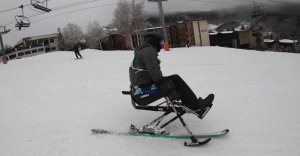 Janice Hobba-Glose, an associate professor in the Nursing Department at Daemen University, spent a week serving our nation’s heroes – volunteering at the 38th National Disabled Veterans Winter Sports Clinic.
Janice Hobba-Glose, an associate professor in the Nursing Department at Daemen University, spent a week serving our nation’s heroes – volunteering at the 38th National Disabled Veterans Winter Sports Clinic.
The annual event took place from April 1-7, 2024, in Snowmass, Colorado, near Aspen, and provides nearly 400 profoundly disabled Vets with training in adaptive Alpine and Nordic skiing, sled hockey, scuba diving, rock wall climbing, and several other adaptive activities, sports, and education.
“As a Professional Ski Instructors of America (PSIA) Certified Adaptive Ski Instructor, I spend my days in Aspen teaching disabled vets how to ski,” Hobba-Glose said. “I teach both stand-up skiers and sit-down skiers how to ski. Some participants have never skied before and others have been skiing before their injuries and started up again, while others used to ski standing up and now must sit down due to stamina or disabilities.”
This was Hobba-Glose’s second year volunteering at the Winter Sports Clinic, but her work on the slopes started a decade ago with the Lounsbury Adaptive Ski Program at Holiday Valley. In the winter of 2022, she became a PSIA Certified Level One Adaptive Ski Instructor.
Hobba-Glose said, “I am a nurse by profession and have a clinical specialty in rehabilitation. My clinical work has been with stroke survivors, spinal cord injured, and traumatic brain injured persons. I also happen to love to ski. I decided to meld my love of skiing with my clinical skills of rehabilitation and help the differently abled skier learn to ski or learn to ski better.”
After she became certified, Hobba-Glose was invited by the director of the Winter Sports Clinic to apply to volunteer – the start of an experience that changed her life.
“I met so many vets who have had their lives turned upside down due to their service to our country,” Hobba-Glose added. “Not one of them wanted to go back and change their lives. They are happy to be veterans and grateful for the experience of serving our country. I have been fortunate enough to be able to not have to fight for my freedom – they did it for me. If I can give back just a few hours of happiness to these vets who fought for my freedom, I am happy to do so.”
The event proved to be a learning experience for Hobba-Glose who said she experienced a week of multidisciplinary interaction.
“I had the opportunity to work with the interprofessional team of physical therapists, occupational therapists, doctors, physician assistants, recreational therapists, case workers, athletic coaches, and seating specialists. Working in rehabilitation nursing for so many years and seeing the interprofessional team in action was amazing. Everyone working together toward a common goal is powerful,” Hobba-Glose concluded.
